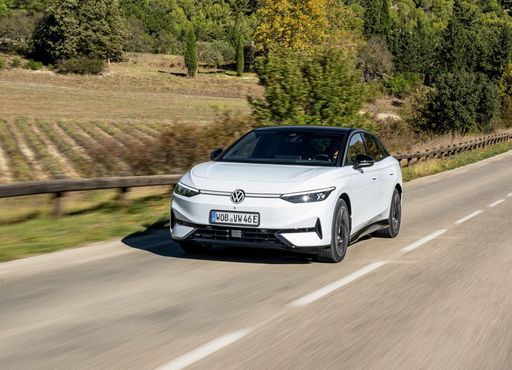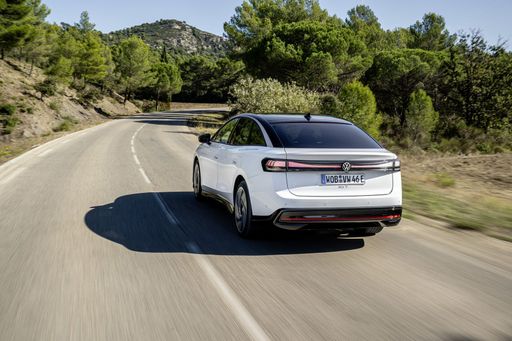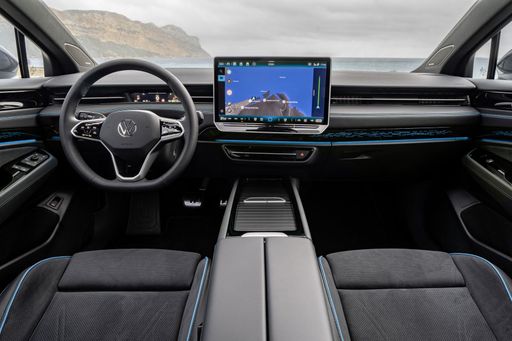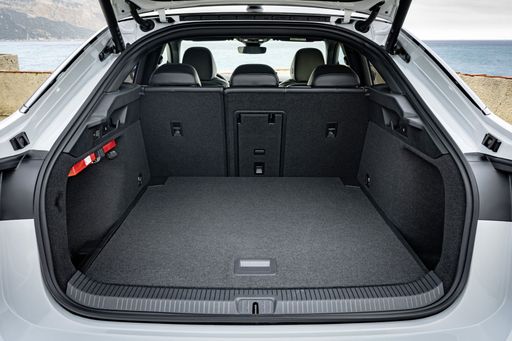VW ID.7 vs Hyundai IONIQ 9 - Differences and prices compared
Costs and Efficiency:
When it comes to price and running costs, the biggest differences usually appear. This is often where you see which car fits your budget better in the long run.
VW ID.7 has a evident advantage in terms of price – it starts at 46400 £, while the Hyundai IONIQ 9 costs 58700 £. That’s a price difference of around 12339 £.
In terms of energy consumption, the advantage goes to the VW ID.7: with 13.60 kWh per 100 km, it’s convincingly more efficient than the Hyundai IONIQ 9 with 19.90 kWh. That’s a difference of about 6.30 kWh.
As for range, the VW ID.7 performs slightly better – achieving up to 708 km, about 88 km more than the Hyundai IONIQ 9.
Engine and Performance:
Power, torque and acceleration are the classic benchmarks for car enthusiasts – and here, some clear differences start to show.
When it comes to engine power, the Hyundai IONIQ 9 has a noticeable edge – offering 428 HP compared to 340 HP. That’s roughly 88 HP more horsepower.
In acceleration from 0 to 100 km/h, the Hyundai IONIQ 9 is minimal quicker – completing the sprint in 5.20 s, while the VW ID.7 takes 5.40 s. That’s about 0.20 s faster.
In terms of top speed, the Hyundai IONIQ 9 performs slight better – reaching 200 km/h, while the VW ID.7 tops out at 180 km/h. The difference is around 20 km/h.
There’s also a difference in torque: Hyundai IONIQ 9 pulls minimal stronger with 700 Nm compared to 679 Nm. That’s about 21 Nm difference.
Space and Everyday Use:
Cabin size, boot volume and payload all play a role in everyday practicality. Here, comfort and flexibility make the difference.
Seats: Hyundai IONIQ 9 offers distinct more seating capacity – 7 vs 5.
In curb weight, VW ID.7 is a bit lighter – 2180 kg compared to 2594 kg. The difference is around 414 kg.
In terms of boot space, the VW ID.7 offers noticeable more room – 532 L compared to 338 L. That’s a difference of about 194 L.
In maximum load capacity, the Hyundai IONIQ 9 performs distinct better – up to 2419 L, which is about 833 L more than the VW ID.7.
When it comes to payload, Hyundai IONIQ 9 distinct takes the win – 643 kg compared to 465 kg. That’s a difference of about 178 kg.
Who wins the race?
The Hyundai IONIQ 9 proves to be wins by a narrow margin and therefore becomes our DriveDuel Champion!
Hyundai IONIQ 9 is the better all-rounder in this comparison.

Hyundai IONIQ 9
Costs and Consumption
View detailed analysis
Engine and Performance
View detailed analysis
Dimensions and Body
View detailed analysis
VW ID.7
VW ID.7 arrives as Volkswagen's electric grand tourer, pairing a low-slung, aerodynamic silhouette with a calm, understated interior that prioritizes comfort and space. It’s a sensible choice for buyers who want a relaxed, high-tech cruiser that covers motorway miles with poise rather than bravado.
details @ Volkswagen AG / VW Media
@ Volkswagen AG / VW Media
 @ Volkswagen AG / VW Media
@ Volkswagen AG / VW Media
 @ Volkswagen AG / VW Media
@ Volkswagen AG / VW Media
 @ Volkswagen AG / VW Media
@ Volkswagen AG / VW Media
Hyundai IONIQ 9
The Hyundai IONIQ 9 is a bold step forward in the automotive world, combining cutting-edge electric technology with a sleek and modern design. This model stands out with its spacious interior and advanced features, ensuring both comfort and convenience for drivers and passengers alike. As Hyundai pushes the envelope in eco-friendly innovation, the IONIQ 9 represents the future of sustainable driving with its impressive range and performance capabilities.
details
 @ Volkswagen AG / VW Media
@ Volkswagen AG / VW Media
|
|
|
|
|
Costs and Consumption |
|
|---|---|
|
Price
46400 - 54200 £
|
Price
58700 - 74400 £
|
|
Consumption L/100km
-
|
Consumption L/100km
-
|
|
Consumption kWh/100km
13.6 - 16.2 kWh
|
Consumption kWh/100km
19.9 - 20.6 kWh
|
|
Electric Range
594 - 708 km
|
Electric Range
600 - 620 km
|
|
Battery Capacity
77 - 86 kWh
|
Battery Capacity
110 kWh
|
|
co2
0 g/km
|
co2
0 g/km
|
|
Fuel tank capacity
-
|
Fuel tank capacity
-
|
Dimensions and Body |
|
|---|---|
|
Body Type
Hatchback
|
Body Type
SUV
|
|
Seats
5
|
Seats
7
|
|
Doors
5
|
Doors
5
|
|
Curb weight
2180 - 2325 kg
|
Curb weight
2594 - 2689 kg
|
|
Trunk capacity
532 L
|
Trunk capacity
338 L
|
|
Length
4961 mm
|
Length
5060 mm
|
|
Width
1862 mm
|
Width
1980 mm
|
|
Height
1535 - 1536 mm
|
Height
1790 mm
|
|
Max trunk capacity
1586 L
|
Max trunk capacity
2419 L
|
|
Payload
460 - 465 kg
|
Payload
586 - 643 kg
|
Engine and Performance |
|
|---|---|
|
Engine Type
Electric
|
Engine Type
Electric
|
|
Transmission
Automatic
|
Transmission
Automatic
|
|
Transmission Detail
Reduction Gearbox
|
Transmission Detail
Reduction Gearbox
|
|
Drive Type
Rear-Wheel Drive, All-Wheel Drive
|
Drive Type
Rear-Wheel Drive, All-Wheel Drive
|
|
Power HP
286 - 340 HP
|
Power HP
218 - 428 HP
|
|
Acceleration 0-100km/h
5.4 - 6.6 s
|
Acceleration 0-100km/h
5.2 - 9.4 s
|
|
Max Speed
180 km/h
|
Max Speed
190 - 200 km/h
|
|
Torque
545 - 679 Nm
|
Torque
350 - 700 Nm
|
|
Number of Cylinders
-
|
Number of Cylinders
-
|
|
Power kW
210 - 250 kW
|
Power kW
160 - 315 kW
|
|
Engine capacity
-
|
Engine capacity
-
|
General |
|
|---|---|
|
Model Year
2023 - 2024
|
Model Year
2025
|
|
CO2 Efficiency Class
A
|
CO2 Efficiency Class
A
|
|
Brand
VW
|
Brand
Hyundai
|
What drive types are available for the VW ID.7?
The VW ID.7 is offered with Rear-Wheel Drive or All-Wheel Drive.
The prices and data displayed are estimates based on German list prices and may vary by country. This information is not legally binding.
